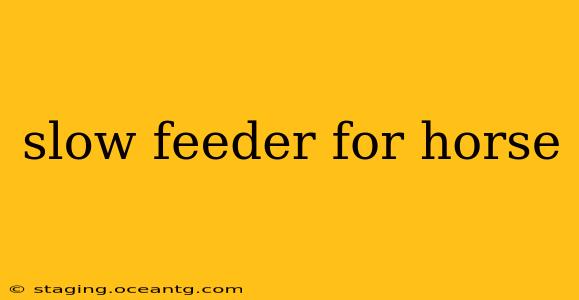Slow feeders for horses are becoming increasingly popular among horse owners concerned about their equine companions' health and well-being. These innovative feeding solutions help prevent a variety of health problems associated with fast eating, such as colic, ulcers, and obesity. This comprehensive guide explores the benefits, types, and considerations when choosing a slow feeder for your horse.
Why Use a Slow Feeder for Horses?
The primary benefit of using a slow feeder is the reduction in eating speed. Horses, in their natural environment, spend a significant portion of their day grazing. This slow, continuous grazing pattern is crucial for their digestive system. Fast eating, often associated with traditional feeding methods, can disrupt this natural process, leading to several serious health issues.
Here's a breakdown of the key advantages:
- Reduced Risk of Colic: Colic, a severe abdominal pain, is a common and potentially fatal condition in horses. Slow feeding significantly reduces the risk of colic by preventing overeating and allowing for proper digestion.
- Improved Digestion: The slow release of food mimics natural grazing, promoting better nutrient absorption and minimizing digestive upset.
- Weight Management: Slow feeders can assist in managing weight, particularly for horses prone to obesity. By slowing down their eating, they consume fewer calories within a given timeframe.
- Reduced Ulcer Risk: Gastric ulcers are another significant problem in horses, often linked to stress and fast feeding. Slow feeders can contribute to a healthier stomach environment.
- Enrichment and Mental Stimulation: The challenge of extracting food from a slow feeder provides mental stimulation and keeps horses occupied, reducing boredom and stress.
What Types of Slow Feeders Are Available?
The market offers a wide variety of slow feeders designed to cater to different horse breeds, feeding styles, and budgets. Here are some of the most common types:
- Hay Nets: These are perhaps the most common and affordable option. They come in various sizes and mesh sizes, allowing for different rates of feed release.
- Slow Feed Hay Bags: Similar to hay nets, but often made from a more durable material and with a larger capacity.
- Hay Feeders: These are larger structures designed to hold a significant amount of hay and release it slowly throughout the day. They can be made from various materials, including plastic, metal, and wood.
- Puzzle Feeders: These innovative feeders are designed to challenge the horse and encourage them to work for their food, further increasing mental stimulation and promoting natural foraging behaviors.
What Size Slow Feeder Do I Need?
The size of the slow feeder you choose depends on several factors:
- Your horse's size and breed: Larger breeds will require larger feeders.
- Your horse's eating habits: A particularly fast eater might benefit from a smaller-mesh net or a more challenging puzzle feeder.
- The amount of hay you feed daily: Ensure the feeder has sufficient capacity to hold a full day's ration.
How Do I Introduce a Slow Feeder to My Horse?
It's crucial to introduce a slow feeder gradually to avoid stress and potential digestive upset. Start by placing a small amount of hay in the feeder and allowing your horse to adjust to the new feeding method. Gradually increase the amount of hay over several days. Monitor your horse's eating behavior and adjust as necessary.
Can Slow Feeders Prevent All Digestive Problems?
While slow feeders significantly reduce the risk of many digestive problems, they are not a guarantee against all issues. Other factors, such as diet, exercise, and overall management, also play a critical role in maintaining a horse's health. It's always advisable to consult with a veterinarian or equine nutritionist for personalized advice.
Are Slow Feeders Suitable for All Horses?
Slow feeders are generally suitable for most horses, but some exceptions exist. Horses with certain dental problems might struggle with some types of feeders. It's always advisable to consult with your veterinarian to ensure a slow feeder is appropriate for your individual horse.
Where Can I Buy a Slow Feeder for My Horse?
Slow feeders are readily available from a variety of online retailers and equine supply stores. When making your purchase, consider the quality of the materials, the size and design, and the overall value.
By carefully considering the factors discussed above, you can choose the right slow feeder to help maintain your horse's health and well-being for years to come. Remember, a happy, healthy horse is a horse that's properly cared for and fed.
